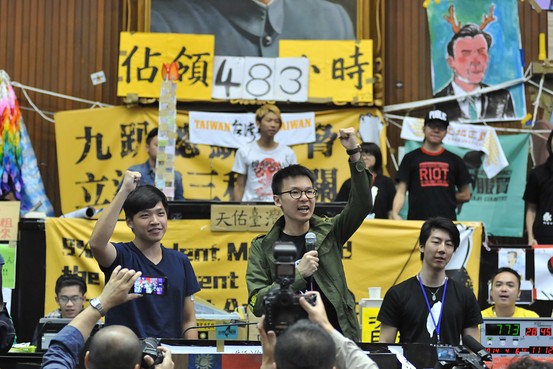Home -> News -> Media -> Taiwan Protests Can’t Stop China Trade
Taiwan Protests Can’t Stop China Trade

Taiwan’s anti-trade protesters, fearful of more open commerce with China, appear unlikely to stop stronger economic ties between the neighbors.
For three weeks, protesters have occupied Taiwan’s legislature to stop the passage of a services trade pact between the two governments.
The protesters, led by student groups, are attempting to block a bill in the current parliamentary session, which runs to June. They claim the pact will hurt Taiwan’s small companies. Among their demands: more public involvement in the drafting process.
While they may delay the bill, there’s a number of reasons to believe the two economies will move closer whether there is a pact or not.
For one, China and Taiwan’s economies already are inextricably linked. About a third of Taiwan’s $300 billion per year in exports go to China, largely electronic components, petrochemicals and textiles.
Many Taiwanese firms, including Foxconn, which assembles Apple Inc.’s iPhone, have set up factories in China to benefit from cheaper costs and a larger domestic market.
Now, Taiwan’s banks, brokers and retailers are hoping to get better access to China’s market through the services pact. Business groups view China’s market as a way to boost the economy, which grew at just over 2% last year, hobbled by high costs and a small domestic market.
Taiwan’s many banks and brokers are fighting at home for business, and profitability has slipped.
The pact would open up another source of revenues for securities brokers and fund houses by allowing them to set up majority-owned branches in central and southern China. (Current Chinese law allows them to hold only minority stakes.)
With closer have economic ties has come a political warming. In February, cabinet members from both places met in the eastern Chinese city of Nanjing, the highest-level official meetings between the governments since 1949. (Both sides have met informally many times.)
President Ma Ying-jeou has pushed an economic détente since he took office in 2008. The two sides passed an Economic Cooperation Framework Agreement in 2010. After the services pact, both sides plan to discuss the full liberalization of trade in goods.
In 2009, Mr. Ma’s government allowed Chinese companies to invest directly in Taiwan. Taipei has permitted its firms to invest in China since the 1990s; last year foreign direct investment into China from Taiwan stood at $8.7 billion, up from $174 million in 1991.
Taiwanese authorities a year ago allowed its banks to accept yuan currency deposits. The services pact would pave the way for institutions to use those deposits, currently at nearly 200 billion yuan, to invest in some Chinese stocks and bond markets.
The public’s view on hugging China closer is more mixed. A recent government-organized poll, released last week, found that 58% of respondents want the protesters to leave the legislature. It also found that 41% of respondents supported the services pact, while 40% disapproved.
Some critics of the pact say it will allow bigger Taiwanese companies to expand across the border, while small-and-medium-sized enterprises don’t have the resources to do so and could face increased competition from Chinese firms.
Another concern among opponents is that more investment and talent will flow to China, further hollowing out Taiwan’s economy. Half of Taiwan’s exports already are produced overseas, mostly in China.
“After years of outflows of investment and people, Taiwan doesn’t have enough innovation to reboot the economy in order to stay competitive in a freer trade environment,” said K.S. Lin, an economics professor at National Taiwan University.
Others say the trend is unstoppable. “Taiwanese people will continue to flock to the other side whether there is a trade pact or not,” said Woods Chen, an economist from Ta Chong Bank.
Mr. Ma’s party has a majority in the Parliament, meaning the legislation is likely to pass eventually in some form.
There’s a lot at stake. Merrill Lynch forecasts Taiwan’s economy will grow 2.9% if the bill passes and 2.5% if it’s delayed into next year.
CLSA, a brokerage, says hopes of better economic ties, reducing Taiwan’s dependency on the technology sector, is part of the reason Taiwanese stock are close to three-year highs. CLSA says foreign funds bought NT$79 billion in stock in the first quarter, while foreign investor turned net sellers of South Korean shares in the same period.
Taiwanese assets could lose their shine if the protests linger. But for now Taiwan’s march toward closer ties with China doesn’t seem like stopping.
- .U.S. Treasury looks to hold more cash to deal with future crises
- .Yum, McDonald's in Shanghai food safety investigation
- .Yellen defends loose Fed policy, says job market still too weak
- .Carl Icahn says 'time to be cautious' on U.S. stocks
- .Samsung Electronics says second quarter profit likely down 24.5 percent; worst in two years
- .U.S. jobs data seen reinforcing strong growth outlook
- .Asia stocks up on buoyant Wall Street, oil near highs

